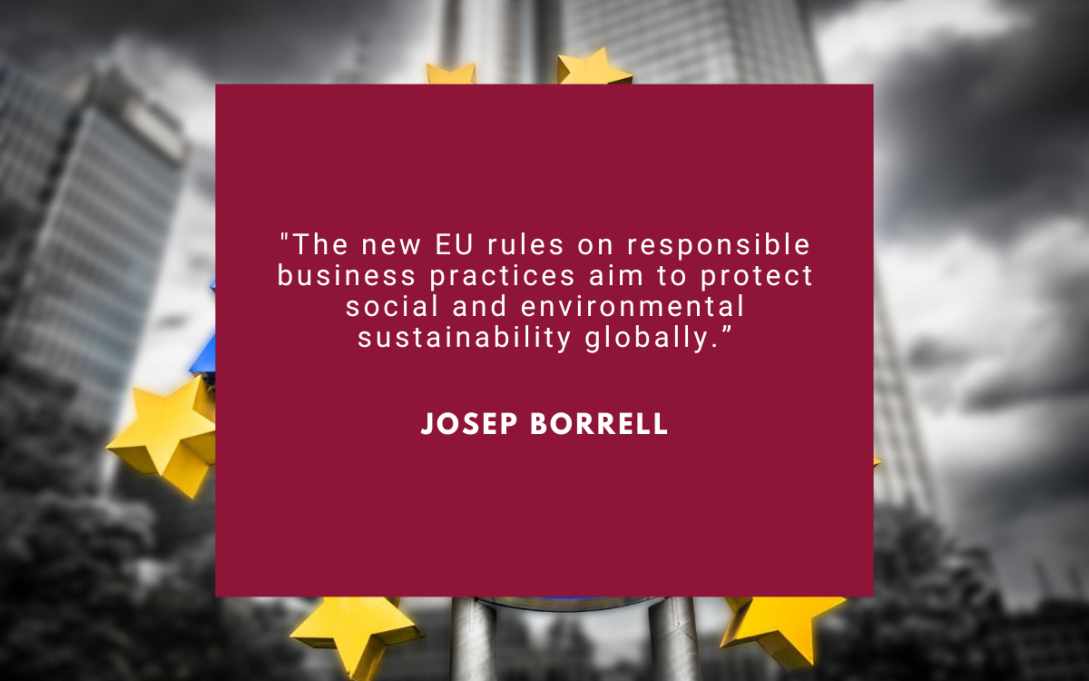Social and environmental sustainability is a global public good

Today, the new EU directive on corporate sustainability due diligence has been officially published. Member States now have until July 2026 to adopt these rules into their own national law. Together with the forced labour regulation and the deforestation-free products regulation, it is part of a series of recent EU laws aimed at ensuring that companies doing business in the EU do not harm the environment or rely on inadequate labour standards or human rights violations. Such rules address a strong demand from European citizens who want to be sure that our companies source responsibly and that the products and services they consume are produced in a way that avoids any such adverse impacts, both within the EU and in other parts of the world.
Recent EU laws aimed at ensuring that companies doing business in the EU do not harm the environment or rely on inadequate labour standards or human rights violations.
Binding rules in these domains are also a recognition that previous attempts to achieve these objectives through self-regulation or voluntary codes of conducts have proven insufficient. Perhaps more than any other event, the collapse of the Rana Plaza building in Bangladesh eleven years ago - killing more than 1,100 factory workers in the garment industry - was a wakeup call for many European consumers. It was a reminder that cheap consumer products often come at the expense of health and safety of workers and communities in other parts of the world and led to calls to hold businesses to account.
Nevertheless, not all of the sustainability rules the EU has recently put in place have been universally welcomed. Inside the EU, some companies voiced fears that social and environmental safeguards would increase bureaucracy and lead to a competitive disadvantage because of rising costs. Outside the EU, those very same rules are sometimes perceived as protectionist measures that would make trade with the EU more difficult or even impossible, or as indirectly restraining their independent policymaking.
The deforestation regulation is one such example. Its rationale is simple: to ensure that products sold in the European Union do not contribute to the destruction of forests around the world. This is crucial to protect biodiversity and fight climate change globally. However, in some parts of the world it has not been welcomed. I vividly remember a ministerial meeting we held as a video conference during the pandemic. One of my interlocutors was sitting in front of a large banner reading: “No to the deforestation regulation”. Why? Because of concerns about how to trace products and verify their deforestation-free origin. This can be complicated and could have a negative impact on the business of smallholder farmers. To gain acceptance for our laws – inside and outside the EU - we have to become better at explaining their rationale, tailor-make our legislation with global consequences in mind, and we need to invest more in helping our partners to put in place the structures necessary to comply with these rules.
To gain acceptance for our laws – inside and outside the EU - we have to become better at explaining their rationale and tailor-make our legislation with global consequences in mind.
Regarding the new corporate sustainability due diligence directive, the most frequent concern voiced by our trading partners, particularly from developing economies, is that of an additional burden on their businesses and that it is not for the EU to decide on production policies in their countries. They also argue that their companies already need to undergo several audits every year to comply with requirements stemming from various different sustainability standards.
However, we based the new EU rules on existing international standards, such as the UN Guidelines for Business and Human Rights, as well as those of the International Labour Organization and of the OECD. In other words, we have made mandatory within the EU a set of principles that were already voluntarily applied by many trading partners and a majority of large companies worldwide. Consequently, a European approach to due diligence will rather ease the administrative burden for business, as it brings some order into the maze of national sustainability standards.
Moreover, our new rules are a response to complaints I have frequently heard from ministers of developing economies, that multinational companies, profiting from their size and market power, tend to choose suppliers with the lowest environmental and social standards. By introducing binding standards, we are extending the responsibility for human rights and environmental protection to those large companies at the top of value chains. They can then be taken to court by victims and may face penalties of up to 5% of their annual turnover. This will hopefully prevent any future Rana Plaza-style tragedy from happening and avoid a global race to the bottom on labour and environmental standards.
This will hopefully prevent any future Rana Plaza-style tragedy from happening and avoid a global race to the bottom on labour and environmental standards.
EU Delegations and Member States’ embassies all over the world are already discussing these new EU policies with our partners. There is great interest and I am confident that by the time the new rules start applying, current reservations will have given way to a more positive assessment of the improvements for workers, communities and environmental protection.
Yet, to be truly effective in addressing sustainability challenges in global value chains, all major economies have to work in the same direction. We need to set legally binding measures at a global level, perhaps through the United Nations. If enough countries implement coherent due diligence rules, it will simplify auditing requirements and prevent firms that apply high standards from being undercut by competitors with larger social and environmental footprints. Economic development must benefit everyone, especially the weakest and poorest. Social and environmental sustainability is not a burden - it is an essential global public good.
